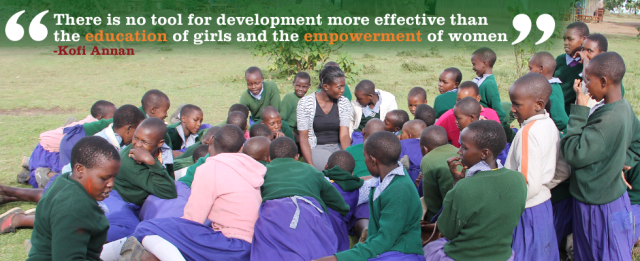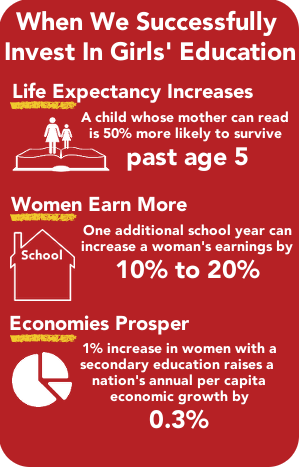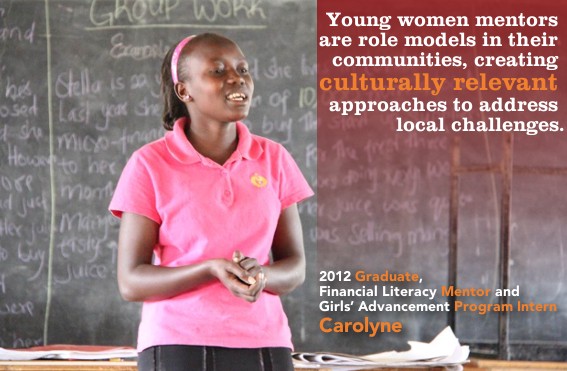
Girls’ Club with Program Associate, Mary Kwena
By Ashley Orton
Global Program Director — Asante Africa Foundation
Women and girls are indeed key to the development of a bright future for Africa, but education is critical to that potential. We at Asante Africa Foundation are concerned that though the enrollment rate of rural Kenyan and Tanzanian girls in primary school equals that of boys, they are not as likely to advance to secondary school. In Tanzania, less than 1% of girls will complete a full secondary school education.¹
The root cause is arguably poverty and parents’ investment in boys’ education over girls’ in the belief that the family will benefit more in the long run. But the generally low cultural value placed on girls’ education is not all that holds them back. The common occurrence of girls’ irregular class attendance throughout the month puts them at an academic disadvantage compared to boys. This is caused by the combination of girls’ lack of information about their bodies leading to low confidence in managing their cycles at school and a lack of safe and sanitary places to do so.

Our Girls’ Advancement Program is changing this dynamic by:
• educating girls in sexual maturation, reproductive health and children’s rights,
• building peer support networks such as girl-led school clubs,
• training young women as community mentors and role models
• fostering greater communication between parents and their daughters, and
• constructing or improving girls’ latrines at school.
Our work aims to increase girls’ attendance and decrease drop out due to pregnancy with a view to keeping girls in school longer and improving their academic performance. But the investment in health knowledge and social support alone is no guarantee of success outside of the classroom. The majority of girls in the rural Kenyan and Tanzanian communities in which we work will not progress to secondary school.
Once they are out of school, girls find that they lack the know-how to build any degree of financial autonomy that would enable them to act on informed decisions about their long-term reproductive health. At a young age most are locked into the cycle of poverty in which they were born and remain dependent on the pockets and mercy of the men in their lives. However, with an additional focus on developing financial literacy and saving habits, we are witnessing girls’ potential to alter that course. Through the Girls’ Advancement Program, girls build health, economic and social assets that enable them to remain in the classroom longer, improving educational opportunities, and give them the tools to pursue healthier, more secure futures beyond it.
Through the work of Asante Africa Foundation’s in-country teams, I regularly hear about the positive changes girls are making in their lives, their support of peers to do the same and how parents are adopting new ways of thinking about cultural practices that hinder their daughters from achieving their dreams both in and out of school. After our 2012 workshops, girls at 4 of the 6 schools took the initiative to form clubs centered on girls’ issues. These clubs provide a sustainable outlet to safely discuss the problems they face on a girl-to-girl level. In one instance last year, girls noticed that something was wrong with a classmate. When questioned, she shared with peers that she hadn’t been feeling well since a recent medical procedure. Realizing the potential for a serious problem, her peers convinced her to inform the head teacher. She subsequently received medical attention that may have saved her life. These young girls used their knowledge of sexual and reproductive health to conclude that their classmate’s condition was not normal. Through discussion and mutual trust, they had the courage to move from knowledge to action.
I am proud to see the tangible impact of the Girls’ Advancement Program on the lives of rural, East African girls who are informed, supportive and proactive. I am equally excited to witness the impact of this work as we train young women from the local communities to facilitate workshops, monitor outcomes and most importantly, mentor adolescent girls.
Carolyne, an Asante Africa Foundation scholarship alumna from a small Maasai village near Narok, Kenya, is now a Girls’ Advancement mentor and intern. Once a shy girl with a fear of public speaking, Carolyne regularly leads workshops on financial literacy, saving and health. She also leads teams in data entry to inform program evaluation. Not only is Carolyne gaining valuable professional skills, she has come into her own as a leader and local role model who young Maasai girls look up to.

These girls are spreading their knowledge to families and friends. Mothers and daughters are now talking to each other about sensitive issues that had been considered culturally inappropriate. They are bringing about change in their lives and communities, one girl and one family at a time as they grow rich in knowledge, rich in confidence and rich in the autonomy to act on informed decisions about their health, bodies, education and dreams. We are excited to watch them thrive. This is yet another example of how educating children leads to transforming their worlds.
“Educate a girl, educate a community”
–Adelaide Hoodless
We need your help to bring this program to more girls! If you would like to sponsor a girl, or help fund additional training materials, contact info@asanteafrica.org
Click here to read an overview of Asante Africa Foundation’s work with rural girls highlighted at Making Cents International’s 2013 Youth Economic Opportunities Conference.

Ashley Orton is the Global Program Director for Asante Africa Foundation, and oversees program development, operations, monitoring and evaluation. Ashley has worked with organizations, activists, volunteers and youth in the fields of international development and human rights for over a decade in the United States and overseas. Click here to read more about Ashley and the rest of our Global Program Team.
1 Global Campaign for Education, “Gender Discrimination in Education: The Violation of Rights of Women and Girls” (2012):17.
